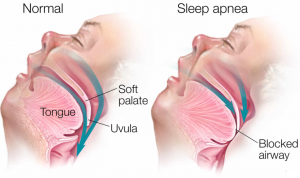What is Sleep Apnea? Should I use CPAP?
These are common questions we hear from most patients recently diagnosed with Sleep Apnea.
For you to better understand your diagnosis and treatment, it is important that you know the answers to these questions.
In this blog post we will cover:
- What is Sleep Apnea
- What is CPAP
- Do I have to use CPAP?
What is Sleep Apnea?
The diagnosis and treatment of sleep apnea is becoming more and more common as time goes by. This has helped with the awareness of the condition and has helped break down the stigma which has been attached to it.
Sleep apnea is a condition where the airway, typically at the soft palate and tongue collapses. This causes a blockage of the airway and pauses in breathing. The pause prompts the brain to react by waking us up briefly to get us breathing again. The response is great, as we are in trouble if it doesn’t. But when it happens too frequently, it has a serious effect on the efficiency of our sleep. Severe Sleep Apnea (which is quite common) is diagnosed when 30 or more of these events happen per hour. CPAP keeps the airway open to allow you to breathe without the blockages happening anywhere near as regularly.

What causes sleep apnea?
It is hard to pinpoint the exact cause of Sleep Apnea and it varies from person to person. Anatomy of the upper airway is a big contributor. Carrying too much weight can be a contributor. Situational factors such as alcohol intake, being pregnant or being sick can also play a part in Sleep Apnea.
Does Sleep Apnea go away?
Generally speaking, Sleep Apnea is a condition that will stick around, however it is not totally impossible for it to go away. Weight loss, changes in lifestyle and management of other health conditions can help reduce the effects of sleep apnea.
What is CPAP?
CPAP stands for Continuous Positive Airway Pressure. CPAP therapy typically involves wearing a mask that is connected to a CPAP therapy machine. A CPAP machine applies pressure to your airway, keeping it open throughout the night. This is how it prevents your airway from blocking and reduces the number of apneas you have throughout the night.
A standard CPAP set up will normally include a CPAP machine, CPAP mask, tubing and power supply unit. The equipment can be a bit annoying and distracting, however in most cases, the benefit in keeping the airway open is far greater than the disturbance caused by the equipment.
Do I have to use CPAP?
It is a good idea to have a trusted medical professional in your corner advising on whether CPAP use is right for you. Things to consider are:
- Your sleep study result
- Symptoms
- Disturbances to bed partner
- Management of other health conditions
Generally speaking, you don’t have to do anything. However, by wearing it every night you are giving yourself a chance to sleep more efficiently in order to enjoy your days more. From time to time it is not feasible to wear CPAP. The effects of this will differ from person to person. Some people find it affects them missing one night where others can go a week or so before noticing the effects.
When sleep apnea is treated effectively it can help with day time energy, mood and management of other health conditions. While it can be embarrassing to wear a CPAP mask, we find the positive benefits often make our patients better people to be around and they are happy to make that sacrifice.
There are other forms of treatment for Sleep Apnea. Again, these are best discussed with a medical professional. Before using any therapy, you want to ensure it is appropriate for you and has a chance of treating your medical condition.
What happens if I don’t use my therapy?
This is a better discussion to have with your Doctor as the reason for using therapy will differ from person to person. If somebody is using to manage symptoms and then stops, there is a good chance the symptoms will return. If somebody is using to manage a co-morbid health condition, then the ill-effects of the co-morbid condition can come into play.
Some people will get away with missing a night from time to time. Again, you just want to run it by your Doctor. Different people have different risk profiles when it comes to managing Sleep Apnea, so it is best to be guided by a medical professional.
How do I get tested for Sleep Apnoea?
Sleep Apnoea is diagnosed by undergoing a sleep study. The first port of call in these situations is going to your GP to discuss your symptoms. From there, your doctor may refer you to a sleep physician and for a sleep study. For more information on the sleep studies we provide, Click here.



I have moderate sleep apnea. Wondering about using cpap. maybe you can help?
And I am wondering too about getting a medical certificate
Paolo, we can help with sleep apnea. Shoot me an email anunn@sleepright.com.au.
What would the medical certificate be for?